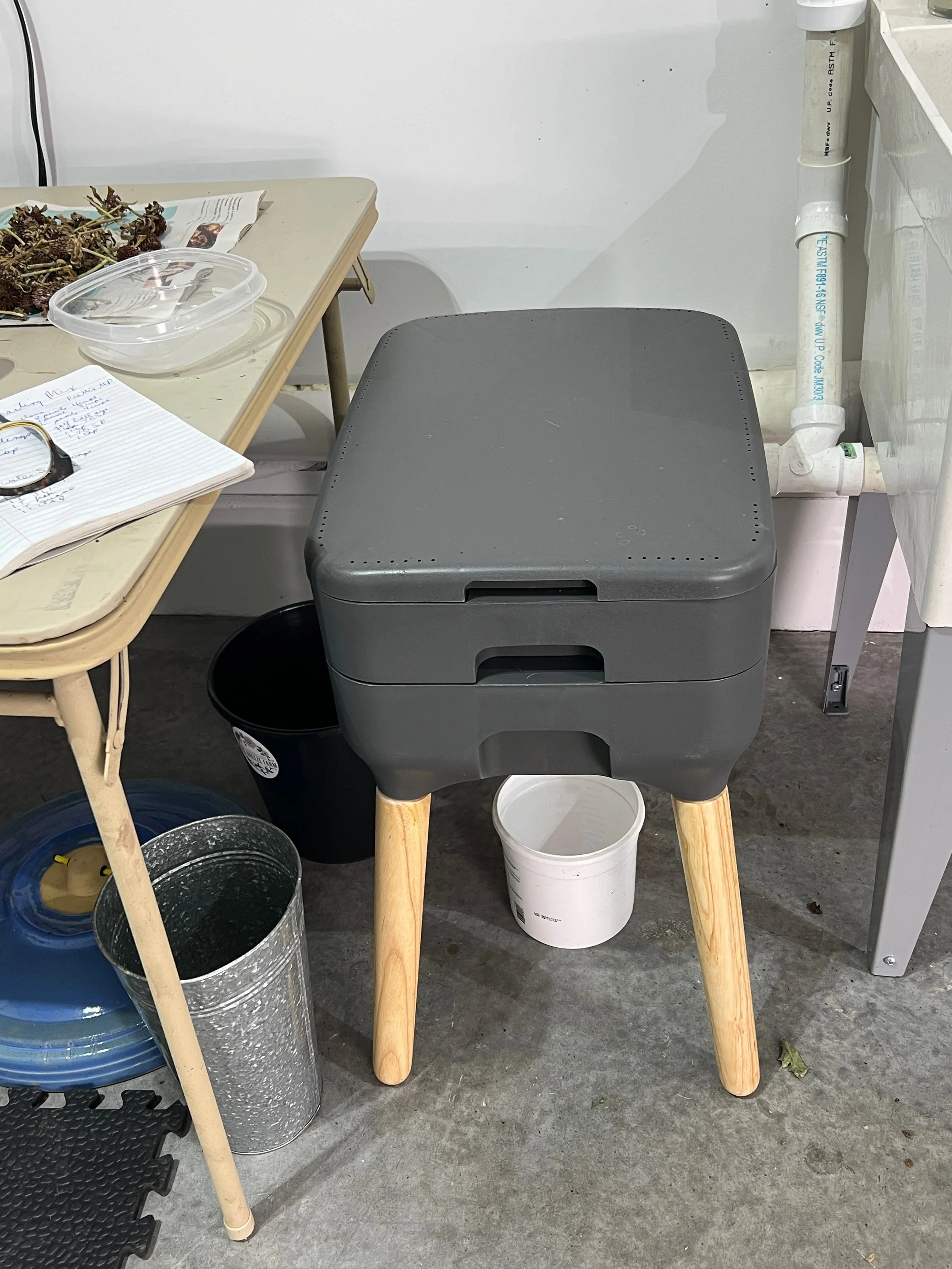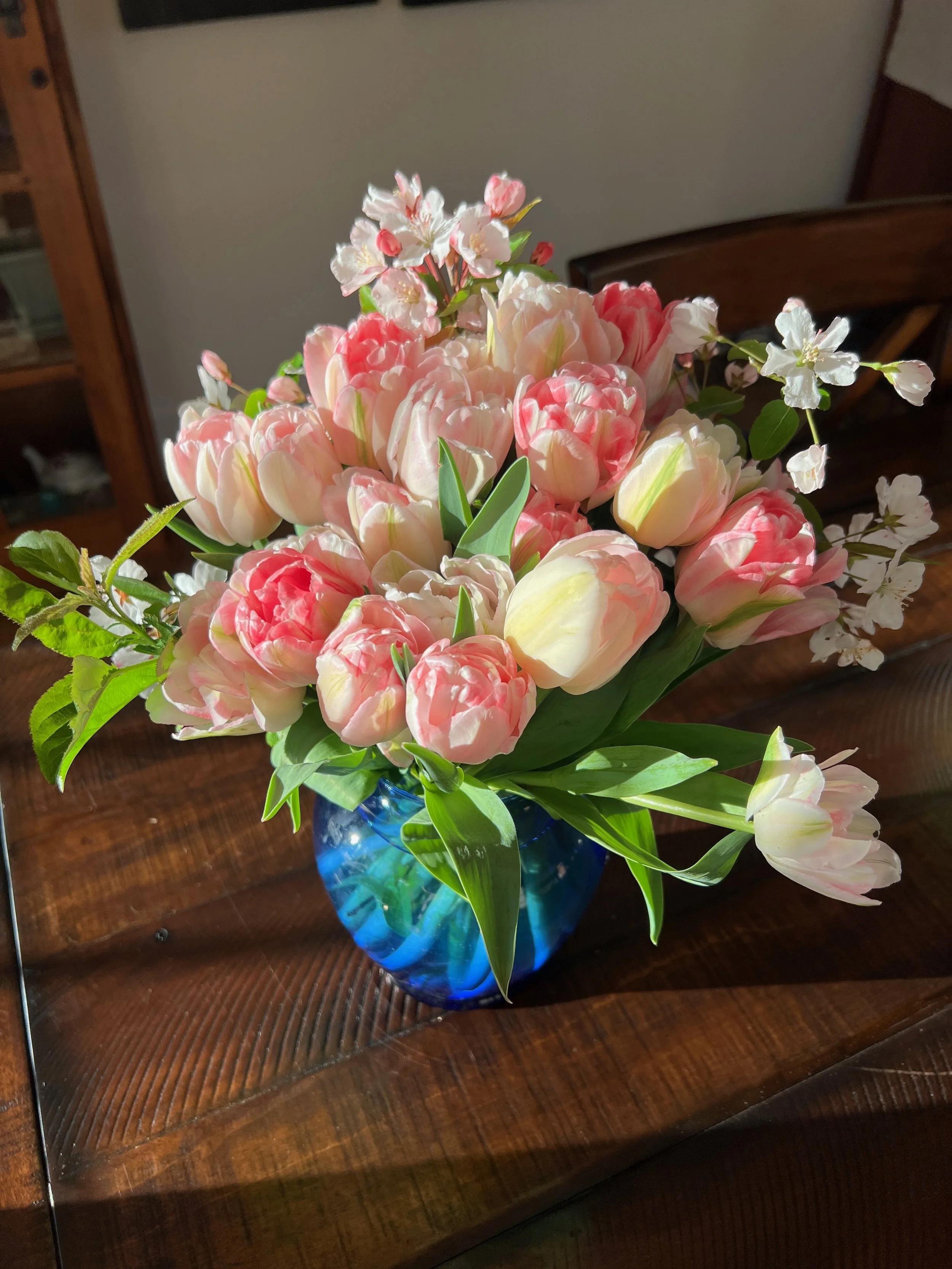The Magic of a Worm Bin
Wintery scene on the farm.
January is usually the in-between month for me. I’ve finished the clean up of last season and haven’t started heavy duty seed starting, yet. It’s one of my favorite times of the year as a flower farmer. I get to spend time inside looking at seed catalogues, studying the needs of various cut flowers, and imagining what my stuffed cooler will look like in just a few months. It’s the month when I get to dream, sketch, and resketch this year’s plan for the field. Crop planning is still a multi-draft activity for me, but I love the state of dreaming because soon it will be a race of me against the weeds.
While January is about dreaming, February is about getting dirty. This month I will start thousands of seeds and as soon as it warms a bit, prepare more of the beds that I didn’t get to in the fall. Most flower farmers love starting seeds, not me! I love the promise of spring. I love thinking about blooming flowers, but the tedium of moving seeds from packet to soil is not an activity I enjoy. I have gotten better at it at least. For my first couple of years I wasted a lot of seed. I didn’t have the right space or the right temperature. Seeds didn’t sprout or grow vigorously.
With only 33 days until spring, this is the time when my seed-starting will really begin to ramp up. Seeds are much cheaper than buying plugs and when I start my own I can choose from a seemingly limitless number of varieties and colors, and I can use 100% natural inputs.
You don’t need to be a flower farmer to start seeds indoors. All you need is a little space and some shop lights, patience, and a spirit for experimentation. Seed starting is a skill that I’m still perfecting, but a recent change in my practice has definitely seen a boost in the health of my seedlings.
The most significant thing that I’ve done recently: I started a worm bin.
Every gardener knows the value of compost as a way to boost the health of the soil, but worm castings provide a magic potion that isn’t as widely utilized. Last year my farming mentor advised that I start a worm bin and, after stalling for about 6 months, I finally did it.
It was easier to do than I imagined and with a little help from Uncle Jim's Worm Farm I soon had a bin, worms, and the start of a vermicast factory. While my husband was not a huge fan of a bin of worm poop in the garage, I can attest that there is no smell, and everything stays inside the bin.
The product that the worms create is nothing short of miraculous. I now use vermicast extract in almost everything I do with seeds. I use it in the form of worm casting tea, which I make by taking a golf ball size chunk of worm castings and placing it in a jar of water. I shake the jar vigorously to get the microbes in the water, then let it sit for 15 minutes. I shake it again before using the water for whatever I’m about to do, either wetting my seed starting mix, or watering growing seedlings. Once the plants are in the field, I also use vermicast extract in all of my foliar sprays.
What is magic about worm castings? Studies have shown that the microorganisms found in earthworm guts are beneficial to plants. They improve a plant’s ability to uptake nutrients, thus boosting growth, and they improve a plant’s resistance to disease. Studies also show that plants that have been exposed to vermicast extract tea retain these microorganisms in their roots. My observations on the success that I have experienced are backed up by science. Scientific Study on Vermicast Extract
I still have my fair share of seed-starting fails, but of all the tricks and hacks I’ve read and tried, I think the worm bin has been the one with the biggest rewards.
If you want to start your own worm bin, and have any questions, please reach out!
In business news . . .
I’ve sold out my flower subscriptions for this season BUT I plan to offer any extra bouquets for sale at my favorite Hopewell shop, Wull & Oak, so there will still be a chance to grab some Cool Breeze flowers.
This season I’ve also boosted my production to sell wholesale through the Jersey Cut Flower Market. JCFM is a group of 10 women-owned businesses growing flowers sustainably to help promote the availability of local flowers to florists and event designers in our area. I’m so excited about the opportunity to collaborate with others to increase the availability of flowers that didn’t fly here, or come doused in chemicals.
As I sit here and think about the big snowstorm in the offing, I’m definitely clinging to those January dreams of so many flowers.





